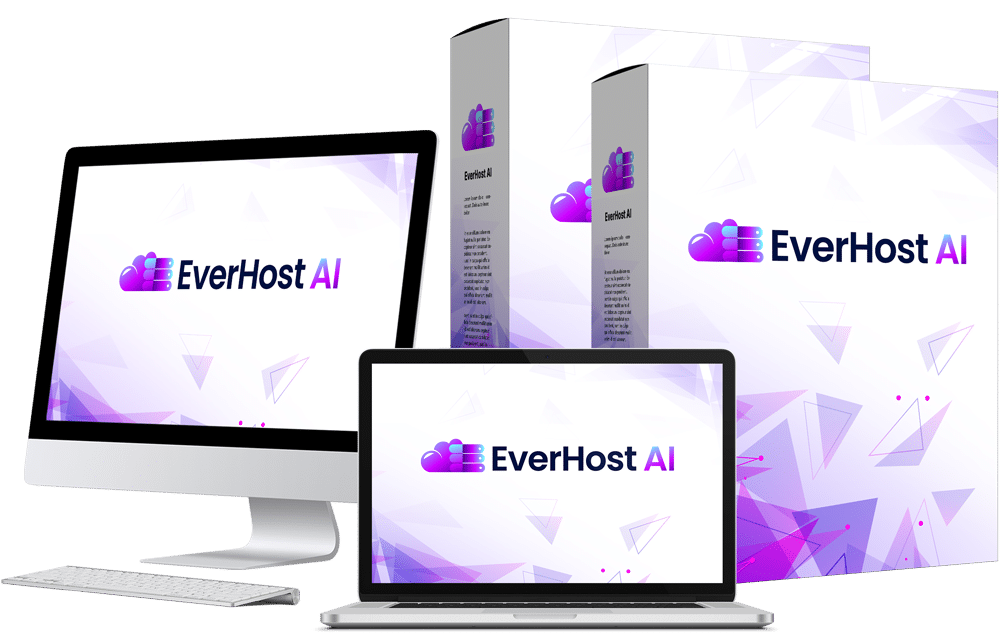Get all EverHost AI OTO links to the direct sales pages. With the big discount and three hot bonus packages value $40k . see all the EverHost AI OTO sales pages below, with all the information for each OTOs.
EverHost AI OTO Links + $40k Value Bonuses

Note: Buy Front-End before OTOs to work well, you can buy FE or OTOs from the Locked link below
>> Front-End <<
>> OTO1 EverHost Ai Premium [$47] Edition <<
>> OTO2 EverHost Ai Max [$47] Edition <<
>> OTO3 EverHost Ai Web Builder [$37] Edition <<
>> OTO4 EverHost Ai Web Conversion [$37] Edition <<
>> OTO5 EverHost Ai Seo unlimited [$67] Edition <<
>> OTO6 EverHost Ai Agency [$197] Edition <<
>> OTO7 EverHost Ai Reseller [$97] Edition <<
EverHost AIX OTO Links Above
All EverHost AI OTO Details
What is EverHost AI ?
𝗕𝗿𝗮𝗻𝗱 𝗡𝗲𝘄 “𝗔𝗠𝗗 𝗘𝗣𝗬𝗖™ 𝗖𝗣𝗨𝘀” 𝗧𝗲𝗰𝗵𝗻𝗼𝗹𝗼𝗴𝘆 𝗕𝗮𝘀𝗲𝗱 𝗛𝗼𝘀𝘁𝗶𝗻𝗴 𝗣𝗹𝗮𝘁𝗳𝗼𝗿𝗺 𝗧𝗼 𝗛𝗼𝘀𝘁 𝗨𝗻𝗹𝗶𝗺𝗶𝘁𝗲𝗱 𝗪𝗲𝗯𝘀𝗶𝘁𝗲𝘀 & 𝗗𝗼𝗺𝗮𝗶𝗻𝘀 𝗢𝗻 𝗨𝗹𝘁𝗿𝗮-𝗙𝗮𝘀𝘁 & 𝗦𝗲𝗰𝘂𝗿𝗲 𝗦𝗲𝗿𝘃𝗲𝗿𝘀 𝗔𝘁 𝗔𝗻 𝗨𝗻𝗯𝗲𝗮𝘁𝗮𝗯𝗹𝗲 𝗟𝗼𝘄 𝗢𝗻𝗲-𝗧𝗶𝗺𝗲 𝗣𝗿𝗶𝗰𝗲…
EverHost AI Demo
Important Info About EverHost AI
Welcome to the exciting world of artificial intelligence! In this article, we will explore the limitless possibilities and advancements that AI technology offers for the future. With EverHost AI leading the way, you can expect groundbreaking innovations and incredible developments that will shape the way we live and work. Get ready to embark on a journey into the future frontier of AI! Have you ever wondered how artificial intelligence is shaping the future of technology? Well, you’ve come to the right place! In this article, we will explore the exciting world of AI and its endless possibilities. So sit back, relax, and let’s dive into the future frontier together!
Understanding Artificial Intelligence
Artificial intelligence, or AI, is a branch of computer science that aims to create machines that can perform tasks that typically require human intelligence. These tasks include learning, reasoning, problem-solving, perception, and language understanding. AI systems are designed to mimic human cognitive functions such as learning from experience, adapting to new situations, and making decisions.
If you’ve ever interacted with a chatbot, used a recommendation system on an e-commerce website, or seen self-driving cars in action, then you’ve witnessed AI at work. It’s everywhere around us, constantly evolving and improving to enhance our daily lives.
Types of Artificial Intelligence
There are two main types of AI: Narrow AI and General AI. Narrow AI, also known as weak AI, is designed to perform a specific task or a narrow range of tasks. It is the most common form of AI that we encounter in our daily lives, such as voice assistants like Siri or Alexa.
Conversational AI, which enables machines to engage in natural language conversations with humans, is a popular application of Narrow AI. It powers chatbots, virtual assistants, and customer service automation tools, making interactions with machines more human-like and engaging.
On the other hand, General AI, also known as strong AI, is a hypothetical form of AI that can understand, learn, and apply knowledge across a wide range of tasks, just like a human being. While General AI is still a long way off, researchers and developers are constantly working towards its realization, pushing the boundaries of what AI can achieve.
The Impact of AI on Various Industries
One of the most exciting aspects of AI is its potential to revolutionize various industries and sectors. From healthcare to finance, education to transportation, AI is making its mark by improving efficiency, productivity, and decision-making processes.
Healthcare
In the healthcare industry, AI is being used to analyze medical images, detect diseases, personalize treatment plans, predict patient outcomes, and improve overall patient care. Machine learning algorithms can process vast amounts of medical data to identify patterns and trends that human doctors might overlook, leading to earlier diagnoses and more effective treatments.
For example, AI-powered diagnostic tools can help radiologists detect cancerous tumors or abnormalities in medical scans. Virtual health assistants can provide personalized guidance to patients on their medications, lifestyle choices, and treatment plans. Remote monitoring devices can track patient vital signs and alert healthcare providers of any sudden changes in health status.
Finance
In the finance industry, AI is transforming how financial institutions operate, from fraud detection to customer service to investment management. Machine learning algorithms are being used to analyze financial data, forecast market trends, automate trading strategies, and optimize risk management practices.
Robo-advisors, which are AI-powered systems that provide automated investment advice to clients, have gained popularity in recent years for their convenience and cost-effectiveness. Chatbots are being used to assist customers with account inquiries, transaction requests, and personalized financial recommendations. AI-based fraud detection systems can analyze millions of transactions in real-time to identify suspicious activities and prevent fraudulent transactions.
Education
In the education sector, AI is being used to personalize learning experiences, automate administrative tasks, and enhance student engagement. Adaptive learning platforms use AI algorithms to analyze individual student performance data and tailor educational content to meet each student’s specific needs and learning pace.
Virtual tutors and chatbots are being used to provide instant feedback, answer student questions, and create interactive learning experiences. AI-driven assessment tools can evaluate student progress, identify areas of improvement, and recommend personalized study resources. Moreover, AI-powered systems can analyze educational data to identify trends, predict student outcomes, and improve teaching strategies.
Transportation
In the transportation industry, AI is driving innovations in autonomous vehicles, traffic management, logistics optimization, and predictive maintenance. Self-driving cars and trucks are equipped with AI algorithms that can perceive their surroundings, make real-time decisions, and navigate complex road conditions without human intervention.
Traffic management systems use AI to analyze traffic patterns, predict congestion, and optimize routing for vehicles, pedestrians, and cyclists. Logistics companies are using AI algorithms to streamline supply chain operations, reduce transportation costs, and improve delivery efficiency. Predictive maintenance tools can analyze vehicle data to anticipate potential breakdowns, schedule timely repairs, and minimize downtime.
The Ethical Considerations of AI
As AI technologies continue to advance and become more integrated into our daily lives, it’s essential to consider the ethical implications and concerns surrounding AI development and deployment. From privacy and bias to accountability and transparency, ethical considerations play a crucial role in ensuring that AI is used responsibly and ethically.
Privacy
One of the most significant ethical concerns related to AI is privacy. With the growing amount of data being collected and analyzed by AI systems, there is a risk of privacy violations, data breaches, and unauthorized access to personal information. It’s essential for organizations and developers to implement robust data privacy measures, encryption protocols, and access controls to protect user data and ensure compliance with privacy regulations.
Bias
Another ethical consideration in AI is bias. AI systems are only as good as the data they are trained on, and if the data contains biases or inaccuracies, the AI system may produce biased or discriminatory outcomes. It’s crucial for developers to carefully curate and preprocess training data, evaluate model performance for bias, and implement fairness measures to mitigate biases in AI systems.
Accountability
AI systems can make decisions and predictions that have profound implications for individuals, organizations, and society as a whole. Ensuring accountability in AI involves establishing clear lines of responsibility, transparency in decision-making processes, and mechanisms for redress if AI systems make mistakes or harm individuals. Regulatory frameworks, ethical guidelines, and industry standards can help promote accountability and ethical conduct in AI development and deployment.
Transparency
Transparency is a key principle in ethical AI, as it promotes trust, accountability, and understanding of AI systems and their decision-making processes. Users should be informed about how AI systems work, what data they collect, how decisions are made, and how their information is used. Developers should strive to make AI systems transparent, interpretable, and explainable to users, regulators, and stakeholders to build trust and confidence in AI technologies.
The Future of Artificial Intelligence
The future of AI is filled with endless possibilities and opportunities for innovation, growth, and transformation across various industries and sectors. As AI technologies continue to evolve and mature, we can expect to see advancements in machine learning, natural language processing, computer vision, and robotics that will reshape how we live, work, and interact with machines.
Machine Learning
Machine learning, a subset of AI that focuses on training machines to learn from data and improve over time, is at the forefront of AI research and development. Advances in deep learning, neural networks, reinforcement learning, and generative models are pushing the boundaries of what AI systems can achieve in terms of image recognition, speech synthesis, language translation, and decision-making.
Natural Language Processing
Natural language processing (NLP) is another exciting area of AI that is revolutionizing how machines understand and generate human language. NLP technologies such as sentiment analysis, language translation, chatbot conversations, and text summarization are enabling machines to communicate with humans in a more natural, intuitive, and context-aware manner.
Computer Vision
Computer vision is a branch of AI that focuses on enabling machines to interpret and understand visual information from the real world, such as images, videos, and live feeds. AI-powered computer vision systems can classify objects, detect patterns, analyze scenes, and track movements with a high degree of accuracy and efficiency, opening up new possibilities for applications in autonomous vehicles, surveillance systems, medical imaging, and augmented reality.
Robotics
Robotics is an interdisciplinary field that combines AI, mechanical engineering, and electronics to design, develop, and deploy intelligent robots that can perform tasks autonomously or collaboratively with humans. AI-powered robots are being used in manufacturing, healthcare, agriculture, defense, and other industries to automate repetitive tasks, assist humans in complex operations, and enhance overall productivity and efficiency.
Conclusion
In conclusion, artificial intelligence is undoubtedly the future frontier of technology, with the potential to revolutionize how we live, work, and interact with machines in a myriad of ways. As AI technologies continue to evolve and mature, it’s essential for researchers, developers, policymakers, and stakeholders to collaborate, innovate, and address the ethical, social, and economic implications of AI in a responsible and sustainable manner.
So keep an eye on the horizon, embrace the possibilities of AI, and get ready to embark on an exciting journey into the future frontier of artificial intelligence! The possibilities are endless, and the future is yours to shape with AI at your side.

Your Hot Bonuses Packages ” Value $40k “
>> Reseller Bonuses Packages 1<<
>> Reseller Bonuses Package 2 <<
>> Hot Bonuses Package 3<<
>> Hot Bonuses Package 4 <<

Table of Contents

